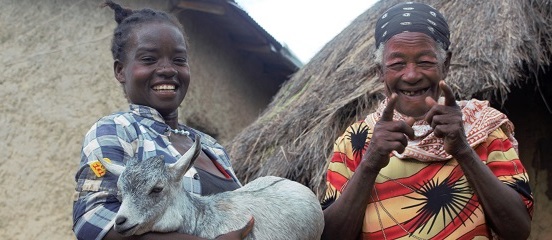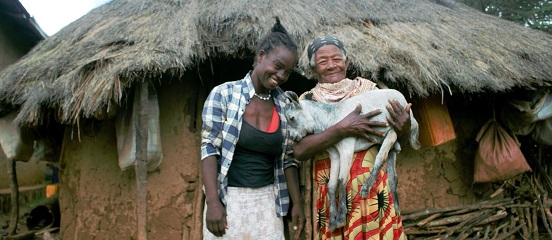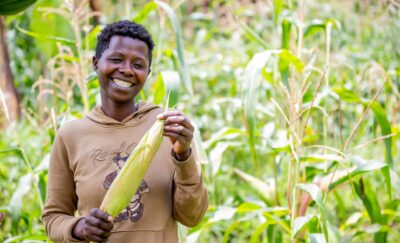News
28 November 2019
Goat kids bring hope for Shegitu’s kids

Shegitu Assefa (left) has just doubled the number of kids she looks after. As well as being mum to two children, an 11-year-old girl and 18-month-old boy, the 28-year-old mother from South Omo in Ethiopia is now the proud owner of two baby goats.
The goat kids mark the start of Shegitu’s goat rearing business, which she hopes will enable her to increase her income and pay for education and nutritious food for her children.
Shegitu received her goat kids from Pita Garday (right), who passed on the two offspring after receiving female goats from Farm Africa a year ago.

The two women are both participants in Farm Africa’s Livestock for Livelihoods project, which promotes goat and milk production to improve the economic and nutritional status of women and their children in South Omo in Ethiopia and Karamoja in Uganda.
The project, which is funded by UK aid from the UK government, involves a revolving goat scheme, which requires each woman who receives goats from Farm Africa to give does (female goats) to another vulnerable woman once her herd has grown, creating a cycle of improved prosperity.
The goat kids bring new hope to Shegitu, who has struggled to earn enough to provide for her her family, despite working hard selling injera and borde (local bread and beer), and baking injera in people’s homes. Shegitu commented:
“I haven’t been able to earn sufficient money, though I had been doing my best to raise my income. Life has become difficult for me with two children. I have to provide my daughter with school materials and uniform, I am also required to feed my son with nutritious food.”
The goat kids offer Shegitu the opportunity to earn money from selling goats and their milk, as she explained: “I am glad I have the goats. With the will of God, I am determined to get them as many as possible and make money. I am hopeful the return will be encouraging to get sufficient food for my children”.
In addition to the animals, Shegitu received training on goat husbandry, animal feed preparation and how and when to seek high quality animal health services. “Now, I know where to go and whom to contact in case my goats get sick.”
Pita Garday was delighted to see her goats’ offspring offer the same opportunities to Shegitu that she received directly from Farm Africa. Pita commented:
“This time last year, I got three female goats from the project. Getting regular training and follow-up from the staff, I have managed to multiply the goats to five. I would have six goats if the third one hadn’t lost her baby. However, I am happy to pass two goat kids on to Shegitu who is a member of another group. I know she needs them too. My message to her is to take good care of the goats as I did and transfer to the other woman who is awaiting.”
Pita continued: “For me, the goats are gifts from God. I will take care of them like my eyes. For this reason, together with my group members, I save money twice a week. I felt safe as the saving ensures the continuity of goat rearing. In case of loss or any other trouble, I can borrow money and replace the goat, for instance.”
“I would like to thank those who have extended hands to support us. The goats have meant food for us, they have meant for money and resources as well. The fear of food shortages will not bother me anymore, I guess. My plan is to increase their number to as many as possible and get profit. I want to buy a milking cow to get more cheese and butter. This will make my life stable, which has been staggering since the loss of my husband. I am sure the goats will make a difference in Shegitu’s life as well.”

Farm Africa is carrying out this work in partnership with the Africa Innovations Institute, an agriculture and food systems research institute, and the Mothers and Children Multisectoral Development Organization, an NGO that works to improve the lives of disadvantaged mothers and children. This project is funded with UK aid from the UK government.




